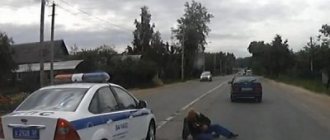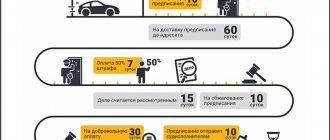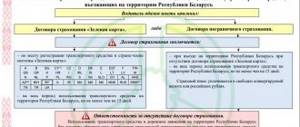On October 20, 2021, a new administrative regulation came into force, which sets out the procedure for the actions of traffic police officers when exercising the function of supervising compliance with legal requirements in the field of road safety.
The document replaced the old regulations, approved by order of the Ministry of Internal Affairs of the Russian Federation dated March 2, 2009 No. 185. Let's look at the main changes.
- Checking documents outside stationary traffic police posts
- Use of portable cameras to record violations
- Video recording when communicating with a traffic police inspector
- Procedure for medical examination for intoxication
- Termination of issuing certificates of road accidents
Checking documents outside stationary traffic police posts
Previously, a document check could serve as a basis for stopping a car only if such a check was carried out at stationary checkpoints. This clause has been removed in the new version of the regulations.
It would seem that now a traffic police inspector can stop you for a “document check” anywhere and in any cases. However, it is not. Paragraph 106 of the new regulations lists the grounds for checking the driver’s documents. These include:
- Identification of signs of violation of traffic rules;
- Availability of clues or data indicating the driver’s involvement in an accident, crime or administrative violation;
- Carrying out measures to prevent road accidents;
- Signs of violations of road safety requirements identified visually or recorded using technical means.
Thus, the requirements for document verification have only become more stringent - the listed grounds are necessary for this.
Check fines
New Federal Law “On Police”. Let's figure it out
Recently, the Government submitted to the State Duma a draft federal law “On Amendments to the Federal Law “On the Police”. Surely the vast majority of readers are aware of it. Undoubtedly, the legal regulation of the activities of law enforcement agencies has always been and is relevant for discussion by lawyers and not only. In this article I would like to consider the most important, in my opinion, provisions of the bill and give them a certain subjective assessment.
In the explanatory note, the authors of the project (Government of the Russian Federation) claim that its main goal is to clarify the powers of the police, as well as strengthen guarantees for the protection of the rights and legitimate interests of citizens and improve the Federal Law “On Police”, since during the study of law enforcement practice it was possible to identify a number of problems , preventing the police from effectively fulfilling their duties to protect citizens and society from criminal attacks. Within the framework of the document, a number of changes are proposed, with different purposes - both functional and linguistic (replacement of terms). However, I would like to dwell only on the main and key, in my opinion, provisions.
1) In paragraph 16 of Article 13, replace the words “if there is evidence of that” with the words “if there are grounds to believe.” We are talking about the right of the police to personally search citizens, search their belongings, as well as their vehicles. The semantic difference between the two formulations above is quite obvious. “Availability of data,” as expected, is an order of magnitude more specific expression of the condition for performing procedural actions, rather than just “reasons to believe”...as it seems, the legislator is introducing a rather vague and ambiguous formulation. On the one hand, this will allow law enforcement officers to respond to offenses more often and more quickly, but will it happen that the phrase “reason to believe” in law enforcement will take on too broad a meaning?...
2) The second point of discussion is the introduction of Article 151, giving police officers the power to open vehicles. At the moment, there is a similar article in the Federal Law “On the Troops of the National Guard of the Russian Federation.” The police will have the right to open a vehicle, including entering it, in cases where there is reason to believe that:
- in the vehicle there are, without special permission, objects or things that are withdrawn from civil circulation or are of limited circulation;
- the person who committed the offense is in a state of intoxication;
— in the vehicle there are, without special permission, objects or things that are withdrawn from civil circulation or are of limited circulation.
The introduced article contains a number of other reasons, but it is worth focusing on the above. The wording “reasons to believe” appears again. Obviously, a police officer without carrying out the appropriate procedure cannot accurately determine the presence of an alcohol level in the blood of an offender that exceeds the norm. This can create a certain “stamp”, upon reference to which the police will have the authority to open any vehicle. Of course, we cannot say this with confidence, and experts can argue, but few would argue that the answer to the question posed will only be obtained in practice, which already forces us to evaluate the provisions of the new article as ambiguous.
3) In paragraph 5 of Article 15 1, the authors argue that a police officer is not responsible for harm caused to citizens and organizations when opening a vehicle , if this measure was applied on the grounds and in the manner established by federal constitutional laws, this Federal Law and others federal laws. The negative reaction of some colleagues to this provision is not entirely clear. Indeed, in the paragraph itself, the condition is the employee’s compliance with federal legislation regulating the specifics of this procedural action. Of course, it is difficult to always provide the ins and outs of each provision of the law, but this clause is a direct guarantee of ensuring the powers of police officers. And is it worth talking about the responsibility of a person whose powers are supplemented precisely for the purpose of giving legality to certain of his actions?... I emphasize - subject to compliance with the legislation at the level specified in the paragraph, which is what the legislator is talking about.
4) Article 16 proposes to introduce paragraph 6, stating that when carrying out measures aimed at detecting items withdrawn from civil circulation or of limited circulation, or if there are grounds to believe that a crime is being prepared (committed) within the boundaries of the territories or at the facilities , the police have the right to cordon off territories, residential premises, buildings and other objects. The literal linguistic meaning of this provision is quite clear. However, here the author expands the scope of “reasons to believe” to include an unfinished crime, which can complicate law enforcement practice by an order of magnitude. In the current version, the grounds for conducting a cordon in the event of an unfinished crime are the prevention of riots and other actions that violate the rights and freedoms of citizens, traffic flow, the operation of communications and organizations, as well as checking information about the discovery of explosives or explosive devices, or poisonous or radioactive substances. Obviously, the new paragraph of this article being introduced is quite twofold: on the one hand, we have all the same questions as when considering the previous provisions, we can again talk about the uncertainty of law enforcement, etc., and on the other hand, there is an additional opportunity to ensure security through legalization carrying out a cordon when a crime is being prepared. Of course, concerns about the implementation of this norm also add to the ambiguity. It is impossible not to say that it allows itself to be interpreted insufficiently specifically, which can lead to its, to put it mildly, too frequent use. However, as in all cases, only the enforcement process itself will tell. I repeat – there are reasons to be afraid, but you shouldn’t be so unequivocal either.
5) In Part 2 of Article 24, which regulates the ability of a police officer to use a weapon during an arrest (if the weapon is already drawn), the words “or touch his firearm” are proposed to be replaced with the words “touch his firearm or perform other actions that give grounds to regard them as threat of attack on a police officer." The change consists in the introduction of another ambiguous category as “committing other actions that give grounds to regard them as a threat of attack on an employee”... as it seems, this provision may be some kind of borrowing from the legislation of other countries. However, everywhere such norms are implemented quite differently. A police officer should definitely have broad guarantees of his own safety due to the specifics of his job duties, but concern is caused by the possibility of different interpretations of the proposed wording and the high probability of its broad interpretation...
To summarize, I would like to note that there is a clear negative public reaction to this bill, but I would like to call for a slightly more restrained assessment. Of course, everyone understands that such projects are not accepted for nothing, that any such innovations have certain goals. And citizens’ fears are not unfounded. And finally, I note that only law enforcement practice will give unambiguous answers to all questions. And time.
Use of portable cameras to record violations
Private cameras or government ones. The new regulations once and for all resolve disputes among motorists about whether “private owners” install portable cameras on the road legally. Paragraph 76 states that cameras recording violations can belong to both government agencies and public organizations.
Clause 76. Special technical means for road traffic supervision related to measuring instruments must be certified as a measuring instrument, have a valid certificate of metrological verification and be used in accordance with the instructions and guidelines on the procedure for using these means.
When supervising road traffic, it is allowed to use special technical means belonging to state and municipal bodies, public associations and organizations, as well as the use of other technical means of photo, sound and video recording.
Installation of cameras in the area covered by temporary signs. According to paragraph 57 of the previous regulations, the place and time of use of mobile automatic fixation devices were determined by the decision of the head of the unit on the order of duty for the employee.
At the same time, the use of automatic fixation devices in places where traffic restrictions are established by temporary road signs was not allowed. The new version of the document does not contain this prohibition. It is now possible to install recording cameras in the temporary sign area.
Federal Law No. 3-FZ dated 02/07/2011
RUSSIAN FEDERATION
THE FEDERAL LAW
About the police
Adopted by the State Duma on January 28, 2011
Approved by the Federation Council on February 2, 2011
(As amended by federal laws dated July 1, 2011 No. 169-FZ, dated July 1, 2011 No. 170-FZ, dated July 19, 2011 No. 247-FZ, dated November 21, 2011 No. 329-FZ, dated November 30, 2011 No. 340-FZ, dated 30.11.2011 No. 342-FZ, dated 03.12.2011 No. 389-FZ, dated 06.12.2011 No. 410-FZ, dated 25.06.2012 No. 88-FZ, dated 03.12.2012 No. 244-FZ, dated 05.04.2013 No. 37-FZ, dated June 28, 2013 No. 134-FZ, dated July 2, 2013 No. 185-FZ, dated November 25, 2013 No. 317-FZ, dated December 28, 2013 No. 388-FZ, dated February 3, 2014 No. 7-FZ, dated 02/03/2014 No. 8-FZ, dated 02/03/2014 No. 15-FZ, dated 07/21/2014 No. 258-FZ, dated 10/14/2014 No. 307-FZ, dated 12/22/2014 No. 431-FZ, dated 02/12/2015 No. 15 -FZ, dated 02.12.2015 No. 16-FZ, dated 03.08.2015 No. 23-FZ, dated 07.13.2015 No. 248-FZ, dated 06.23.2016 No. 201-FZ, dated 07.03.2016 No. 227-FZ, dated 03.07 .2016 No. 305-FZ, dated May 28, 2017 No. 102-FZ, dated June 18, 2017 No. 122-FZ, dated July 29, 2017 No. 272-FZ, dated December 5, 2017 No. 391-FZ, dated December 29, 2017 No. 442- Federal Law, dated 03/07/2018 No. 56-FZ, dated 07/29/2018 No. 268-FZ, dated 08/03/2018 No. 283-FZ, dated 08/03/2018 No. 332-FZ, dated 04/01/2019 No. 48-FZ, dated 06/06. 2019 No. 122-FZ, dated July 18, 2019 No. 182-FZ, dated October 1, 2019 No. 328-FZ, dated October 16, 2019 No. 337-FZ, dated December 2, 2019 No. 404-FZ, dated December 27, 2019 No. 487-FZ , dated 02/06/2020 No. 12-FZ, dated 12/29/2020 No. 465-FZ, dated 12/30/2020 No. 518-FZ, dated 02/24/2021 No. 20-FZ, dated 02/24/2021 No. 22-FZ, dated 04/05/2021 No. 80-FZ)
Chapter 1. General provisions
Article 1. Appointment of the police
1. The police are intended to protect the life, health, rights and freedoms of citizens of the Russian Federation, foreign citizens, stateless persons (hereinafter also referred to as citizens; persons), to combat crime, protect public order, property and to ensure public safety.
2. The police immediately come to the aid of anyone who needs their protection from criminal and other illegal attacks.
3. The police, within the limits of their powers, provide assistance to federal government bodies, government bodies of constituent entities of the Russian Federation, other government bodies (hereinafter also referred to as state bodies), local government bodies, other municipal bodies (hereinafter also referred to as municipal bodies), public associations, as well as organizations, regardless of their form of ownership (hereinafter referred to as organizations), officials of these bodies and organizations (hereinafter referred to as officials) in protecting their rights.
Article 2. Main directions of police activity
1. Police activities are carried out in the following main areas:
1) protection of the individual, society, state from illegal attacks;
2) prevention and suppression of crimes and administrative offenses;
3) identification and disclosure of crimes, conducting inquiries in criminal cases;
4) search for persons;
5) proceedings in cases of administrative offenses, execution of administrative penalties;
6) ensuring law and order in public places;
7) ensuring road safety;
 (Clause has lost force - Federal Law dated July 3, 2016 No. 227-FZ)
(Clause has lost force - Federal Law dated July 3, 2016 No. 227-FZ)
9) (Clause has lost force - Federal Law dated December 5, 2017 No. 391-FZ)
10) (Clause repealed - Federal Law dated July 3, 2016 No. 227-FZ)
11) state protection of victims, witnesses and other participants in criminal proceedings, judges, prosecutors, investigators, officials of law enforcement and regulatory authorities, as well as other protected persons;
12) carrying out expert and forensic activities.
2. By decision of the President of the Russian Federation, police officers may participate in activities to maintain or restore international peace and security.
Article 3. Legal basis for police activities
1. The legal basis for the activities of the police is the Constitution of the Russian Federation, generally recognized principles and norms of international law, international treaties of the Russian Federation, federal constitutional laws, this Federal Law, other federal laws, regulatory legal acts of the President of the Russian Federation and regulatory legal acts of the Government of the Russian Federation, and also regulatory legal acts of the federal executive body that carries out the functions of developing and implementing state policy and legal regulation in the field of internal affairs (hereinafter referred to as the federal executive body in the field of internal affairs).
2. The police in their activities are also guided by the laws of the constituent entities of the Russian Federation on issues of maintaining public order and ensuring public safety, issued within the limits of their competence.
3. The federal executive body in the field of internal affairs develops and submits, in the prescribed manner, to the President of the Russian Federation and the Government of the Russian Federation draft federal constitutional laws, federal laws, normative legal acts of the President of the Russian Federation and normative legal acts of the Government of the Russian Federation, as well as proposals for improvement of legislative and other regulatory legal acts on issues related to police activities.
Article 4. Police organization
1. The police are an integral part of a single centralized system of the federal executive body in the field of internal affairs.
2. The police may include units, organizations and services created to perform the duties assigned to the police (hereinafter referred to as police units).
3. The management of police activities is carried out, within their competence, by the head of the federal executive body in the field of internal affairs, the heads of territorial bodies of the federal executive body in the field of internal affairs (hereinafter referred to as territorial bodies) and the heads of police departments. The heads of these bodies and divisions are responsible for fulfilling the duties assigned to the police.
4. The composition of the police, the procedure for the creation, reorganization and liquidation of police units are determined by the President of the Russian Federation.
5. Standards and limits for the staffing level of police units within the established staffing levels of internal affairs bodies are determined by the head of the federal executive body in the field of internal affairs.
Chapter 2. Principles of police activity
Article 5. Observance and respect for human and civil rights and freedoms
1. The police carry out their activities on the basis of observance and respect for the rights and freedoms of man and citizen.
2. Police activities that restrict the rights and freedoms of citizens shall be immediately terminated if a legitimate goal has been achieved or it has become clear that this goal cannot or should not be achieved by limiting the rights and freedoms of citizens.
3. A police officer is prohibited from resorting to torture, violence, or other cruel or degrading treatment. A police officer is obliged to suppress actions that deliberately cause pain, physical or mental suffering to a citizen.
4. When contacting a citizen, a police officer is obliged to:
1) state your position, rank, surname, present your official identification at the request of the citizen, and then state the reason and purpose of the appeal;
2) if measures are applied to a citizen that restrict his rights and freedoms, explain to him the reason and grounds for the application of such measures, as well as the rights and obligations of the citizen arising in connection with this.
5. A police officer, if a citizen approaches him, is obliged to state his position, rank, surname, listen carefully to him, take appropriate measures within the limits of his powers, or explain whose competence it is to resolve the issue raised.
6. Information about the private life of a citizen obtained as a result of police activities cannot be provided to anyone without the voluntary consent of the citizen, except in cases provided for by federal law.
7. The police are obliged to provide every citizen with the opportunity to become familiar with documents and materials that directly affect his rights and freedoms, unless otherwise provided by federal law.
Article 6. Legality
1. The police carry out their activities in strict accordance with the law.
2. Any restriction of the rights, freedoms and legitimate interests of citizens, as well as the rights and legitimate interests of public associations, organizations and officials is permissible only on the grounds and in the manner provided for by federal law.
3. A police officer is prohibited from inciting, inducing, or inducing, directly or indirectly, anyone to commit illegal actions.
4. A police officer cannot justify his actions (inaction) when performing official duties by referring to the interests of the service, economic feasibility, illegal demands, orders and instructions of superior officials or any other circumstances.
5. The use of state coercive measures by a police officer to perform the duties and exercise the rights of the police is permissible only in cases provided for by federal law.
6. The federal executive body in the field of internal affairs ensures control over the legality of decisions and actions of police officials.
Article 7. Impartiality
1. The police protect the rights, freedoms and legitimate interests of a person and citizen, regardless of gender, race, nationality, language, origin, property and official status, place of residence, attitude to religion, beliefs, membership in public associations, as well as other circumstances.
2. A police officer is prohibited from being a member of political parties, financially supporting political parties and taking part in their activities. When carrying out official activities, a police officer should not be bound by the decisions of political parties, other public associations and religious organizations.
3. A police officer must show respect for the national customs and traditions of citizens, take into account the cultural and other characteristics of various ethnic and social groups, religious organizations, and promote interethnic and interfaith harmony.
4. A police officer, both on duty and off duty, must refrain from any action that may cast doubt on his impartiality or harm the authority of the police.
Article 8. Openness and publicity
1. The activities of the police are open to society to the extent that this does not contradict the requirements of the legislation of the Russian Federation on criminal proceedings, on proceedings in cases of administrative offenses, on operational investigative activities, on the protection of state and other secrets protected by law, as well as does not violate the rights of citizens, public associations and organizations.
2. Citizens, public associations and organizations have the right, in the manner established by the legislation of the Russian Federation, to receive reliable information about the activities of the police, as well as to receive from the police information that directly affects their rights, with the exception of information to which access is limited by federal law.
3. The police regularly inform state and municipal authorities and citizens about their activities through the media, the information and telecommunications network Internet, as well as through reports from officials (at least once a year) to the legislative (representative) bodies of state power of the constituent entities of the Russian Federation , representative bodies of municipalities and before citizens. The frequency, reporting procedure, as well as the categories of officials authorized to report to these bodies and citizens are determined by the federal executive body in the field of internal affairs.
4. The police, in accordance with the legislation of the Russian Federation, provide information about their activities to the media upon official requests from their editorial offices, as well as by holding press conferences, distributing reference and statistical materials, and in other forms.
5. At the request of media editorial offices, in the manner determined by the federal executive body in the field of internal affairs, accreditation of journalists is carried out to cover the activities of the police.
6. The federal executive body in the field of internal affairs, in accordance with the legislation of the Russian Federation, has the right to establish mass media to cover the activities of the police.
Article 9. Public trust and support of citizens
1. The police, in carrying out their activities, strive to ensure public confidence in themselves and the support of citizens.
2. The actions of police officers must be reasonable and understandable to citizens.
3. If a police officer violates the rights and freedoms of citizens or the rights of organizations, the police are obliged, within the limits of their powers, to take measures to restore the violated rights and freedoms. In the manner determined by the federal executive body in the field of internal affairs, the police apologize to the citizen whose rights and freedoms were violated by a police officer at the citizen’s place of residence (residence), work or training in accordance with his wishes. (As amended by Federal Law dated July 2, 2013 No. 185-FZ)
4. Information discrediting the honor, dignity and business reputation of a citizen, made public by a police officer, if found to be untrue by a court, investigator, investigative agency or the police itself must be refuted in the same form in which they were made public, in as short a period as possible, but not exceeding one month from the date such information was recognized as untrue.
5. The federal executive body in the field of internal affairs conducts constant monitoring of public opinion on the activities of the police, as well as monitoring the interaction of the police with civil society institutions. The results of this monitoring are regularly brought to the attention of state and municipal authorities and citizens through the media and the information and telecommunications network Internet.
6. Public opinion is one of the main criteria for the official assessment of police activities, determined by the federal executive body in the field of internal affairs.
7. Public councils are formed under the federal executive body in the field of internal affairs and territorial bodies, which are designed to ensure the coordination of socially significant interests of citizens of the Russian Federation, federal government bodies, government bodies of the constituent entities of the Russian Federation, local governments, public associations, human rights, religious and other organizations, including professional associations of entrepreneurs, to resolve the most important issues of police activity by:
1) involving citizens and public associations in the implementation of state policy in the field of protecting public order, ensuring public safety and combating crime;
2) participation in the development and consideration of concepts, programs, initiatives of public associations and citizens on the most pressing issues of police activity;
3) conducting a public examination of draft federal laws and other regulatory legal acts on issues of police activity;
4) discussing issues related to police activities in the media;
5) exercising public control over the activities of the police.
8. Public councils are formed on the basis of the voluntary participation in their activities of citizens of the Russian Federation, public associations and organizations in the manner established by the President of the Russian Federation.
Article 10. Interaction and cooperation
1. When carrying out their activities, the police interact with other law enforcement agencies, state and municipal bodies, public associations, organizations and citizens.
2. When performing their duties, the police may use the capabilities of state and municipal bodies, public associations and organizations in the manner established by the legislation of the Russian Federation.
3. The police, within the limits of their powers, provide assistance to state and municipal bodies, public associations and organizations in ensuring the protection of the rights and freedoms of citizens, compliance with law and order, and also provide support for the development of civil initiatives in the field of crime prevention and law enforcement.
4. State and municipal bodies, public associations, organizations and officials must assist the police in fulfilling their duties.
5. The interaction of the police with law enforcement agencies of foreign states and international police organizations is carried out in accordance with international treaties of the Russian Federation.
Article 11. Use of achievements of science and technology, modern technologies and information systems
1. In their activities, the police are obliged to use the achievements of science and technology, information systems, communication networks, as well as modern information and telecommunications infrastructure.
2. The police, in the manner established by the legislation of the Russian Federation, use electronic forms for receiving and registering documents, notifications about the progress of providing public services, interaction with other law enforcement agencies, state and municipal bodies, public associations and organizations.
3. The police use technical means, including audio, photo and video recording equipment, when documenting the circumstances of crimes, administrative offenses, circumstances of incidents, including in public places, as well as to record the actions of police officers performing their assigned duties.
4. The federal executive body in the field of internal affairs provides the police with the opportunity to use the Internet information and telecommunications network, automated information systems, and integrated data banks.
Chapter 3. Responsibilities and rights of the police
Article 12. Responsibilities of the police
1. The police have the following duties:
1) receive and register (including in electronic form) statements and reports of crimes, administrative offenses, and incidents; issue applicants, on the basis of personal requests, notifications about the acceptance and registration of their written statements about crimes, administrative offenses, and incidents; carry out, in accordance with jurisdiction, verification of statements and reports of crimes, administrative offenses, incidents and take measures on such statements and reports provided for by the legislation of the Russian Federation, inform applicants about the progress of consideration of such statements and reports within the time limits established by the legislation of the Russian Federation, but at least once a month; transfer (send) statements and reports of crimes, administrative offenses, incidents to state and municipal bodies, organizations or officials whose competence includes resolving relevant issues, with notification of this within 24 hours to the applicant; inform the relevant government and municipal authorities
Video recording when communicating with a traffic police inspector
Let’s say right away that you can film a traffic police inspector. Despite the fact that direct permission to film police officers has disappeared from the new regulations, there is no ban on this.
The free receipt and production of information by a citizen is guaranteed both by the main law of the Russian Federation - the Constitution, and by other federal laws.
Part 4 of Article 29 of the Constitution of the Russian Federation:
Everyone has the right to freely seek, receive, transmit, produce and disseminate information by any lawful means. The list of information constituting a state secret is determined by federal law.
Part 2 of Article 8 of the Federal Law “On Police”:
Citizens, public associations and organizations have the right, in the manner established by the legislation of the Russian Federation, to receive reliable information about the activities of the police, as well as to receive from the police information that directly affects their rights, with the exception of information to which access is limited by federal law.
Thus, the traffic police inspector has no right to prevent the driver from making a video recording. Restriction of the right to video recording is possible when carrying out operational-search activities, in order to protect state and other secrets protected by law, and protect the rights of citizens.
Now the police can do anything: “The law is aimed at countering future protests”
The State Duma supported in the first reading a bill to expand the powers of the police.
Now the servants of law and order will have more reasons to open fire, the police will be able to open cars when there is a threat to the life of a citizen, during mass riots, emergencies, the threat of a terrorist attack, to stop a crime and arrest. The police will cordon off residential premises and other objects, and in the cordoned off area they will conduct inspections of citizens, their personal belongings and vehicles.
Ivan Mironov about how innovations conflict with human rights and constitutional freedoms of a citizen of the Russian Federation; in a conversation with Nakanune.RU he suggested that the bill was being introduced because of the authorities’ fears about upcoming protests.
— How do you feel about the bill expanding the rights and powers of the police?
— It’s quite a logical law. That is, if someone thinks that an ordinary police officer has the Criminal Code, the Administrative Code, the Criminal Procedure Code, and also the Law “On the Police” in his head, then he is deeply mistaken. Often, an ordinary police officer has two light bulbs in his head - green and red, “you can” and “you can’t.” When, it seems, it’s possible, but, it seems, there are restrictions in the law, the employee starts to get “troubled.” This law was supposed to remove this certain duality between what a police officer can do and what is prescribed in legislative acts. Now, in principle, everything is finally possible, and police officers will not be bothered over such trifles.
— That is, what will change now, in principle?
“Now he can enter wherever he wants with virtually no reason, and what reason there is is based on reports of a possible crime, or if this place can somehow be connected with the events of a crime.” Now the policeman can search whoever he wants, however he wants, without going into much detail about the reasons or reasons. He can shoot, yes, if there is a threat of attack.
- What does all this have to do with it?
— The state is far-sighted, it has learned to predict many events and the course of historical development of our great country, and everyone understands that the events that we observed in Belarus and Ukraine may not bypass the Russian Federation, so we must be prepared in advance. Preparations are underway in the form of creating a regulatory framework for suppressing riots, uprisings and all protests initiated by leftist forces.
— Won’t this now become a field for abuse?
- Of course it will! But who cares now? All these innovations are designed to ensure that all police officers in Russia are honest, ideal and in all their actions are guided only by justice, common sense and the protection of citizens. But, naturally, if our contingent turns out to be a little different, then this will probably provoke a wave of police lawlessness.
— In general, doesn’t the bill itself contain any obvious contradictions with human rights, the constitutional rights of a citizen of the Russian Federation?
- What Constitution, what rights? Of course, this violates everything - the right to privacy, inviolability of home, and everything else. In fact, such an expansion of powers is understandable and possible in wartime, if martial law is introduced. If we were in 1941 now, Moscow would be under siege, gangs of saboteurs would be running through the streets, then yes, this is understandable, this is understandable. Maybe there is something we don't know? Maybe we are already in a pre-war state, and that’s why we are introducing all these necessary measures?
“We see what happens in the United States when the police shoot at citizens; a few months ago, large protests began because of this.
“I think we will have all this, but there won’t be protests like in America.” Can we have protests because a police officer shot someone there? Of course, all such “excesses” are inevitable. This is despite the fact that the American police have much more restrictions than ours now. Because ours now practically don’t have them. You can use weapons when there is a threat of attack, for example. Threat! Not an attack, not to protect one’s life, health or to protect the life and health of one’s colleagues, but “under threat.” Anything can be put under threat - “he stood nearby, a threat emanated from him, I felt it.”
- Or did you look at it wrong?
- Yes! That is, every lawlessness of police officers can now be legally justified, and it will be almost impossible to prove guilt. That's what's important. Now any personal search or search of a vehicle can be justified by the fact that there is a suspicion that there may be stolen items there. Well, what kind of nonsense is this? That is, now you don’t need any regulations in principle, procedural documents in order to do this, you don’t need anything! You can always make a mistake with some anonymous message and do whatever you want with a person, with a person’s property and with his home. Yes, we are not talking about a search, but an inspection of things without any basis, but this line between search and inspection practically does not exist. There are simply certain procedural nuances.
— Such tightening in the United States happened after September 11, but in our country, roughly speaking, “where did the bathhouse fall from?” And why is society not outraged?
“You can’t surprise our society with anything for a long time; it doesn’t give a voice, or its voice is so thin and quiet that simply no one hears.” Why is this happening now? We are preparing for those events that will inevitably happen. Because first, of course, we will have an aggravation of dissatisfaction with the economic situation in our country. 2021 will be a very difficult year, everyone understands this and is preparing for it. If mass vaccination against coronavirus is now being introduced, it is unlikely that we will see lines of sufferers in all regions who want to “spread” an untested medicine for themselves; there may be mass protests. Accordingly, the authorities are simply concerned about protecting their interests.
— Transit of power, again?
- Yes, transit of power. And the authorities will fight for the existence of the current system and regime. Therefore, all risks are taken into account and imposed - and a similar law appears.
Procedure for medical examination for intoxication
According to the new regulations, if the result of an examination for intoxication carried out at a stationary post or other premises of the internal affairs body is negative and there are no grounds for referral to a medical institution for examination, the driver is transported to the place of removal from driving or to the location of his car (clause 233 of the Regulations) .
Previously, the inspector was required to deliver the driver to the car only if an examination was carried out at a medical institution.
Law changes
One of the obvious changes in the Law was the reform from the police to the police. In this regard, in 2011, an extraordinary recertification of all internal affairs employees was carried out. Employees of the Ministry of Internal Affairs who refused to undergo recertification or did not pass it were dismissed from public service. There were also active attempts to hinder the progress of the law, in particular regarding the renaming of the police, but the law was nevertheless adopted in its original sense and for more than four years now there have been no new complaints regarding the renaming.
In 2015, a bill was introduced to the State Duma that caused a wide resonance.
The bill, on the one hand, greatly reduces the rights of ordinary citizens, and on the other hand, it proposes to give law enforcement officers significant powers.
The first change is a proposal to exclude the rule that the police must ensure the trust of citizens and society in themselves and replace it with another, the essence of which is that the police rely on the support of citizens, that is, to introduce the so-called “presumption of trust.” Human rights activists do not approve of this point for the reason that the level of trust in the police in our country is low, and as a result of the adoption of the norm, there may even be a certain punishment for failure to show trust, because of which many conscientious citizens may suffer.
The parties promoting this project, on the contrary, argue that the police are representatives of the state, therefore the support of citizens should be built in from the very beginning.
The changes also affected the use of weapons by the police. It is proposed to allow opening fire on minors, women, and disabled people (today this is prohibited). The exception is proposed to be left only for women with obvious signs of pregnancy.
The bill proposes to no longer provide protection to citizens if they contact police officers without presenting documents.
Another high-profile innovation that is planned to be introduced is changes to the rules for searching citizens, personal belongings or vehicles. If now a police officer is authorized to carry out this procedure only if there is specific data on the existence of an offense, then in the future it is proposed to conduct an inspection and search if an offense is suspected.
Although the draft has not yet been reviewed, if adopted, every citizen should familiarize themselves with the changes so as not to find themselves in an uncomfortable situation.
Since the police are a state law enforcement agency, as a result of which we often intersect with them in everyday life, knowledge of the Law “On the Police” can be useful to everyone.
Termination of issuing certificates of road accidents
From now on, the traffic police will no longer issue certificates of road accidents. According to the new rules, based on the results of registration of an accident, traffic police officers will draw up only procedural documents:
- decision to refuse or initiate proceedings regarding an administrative offense;
- administrative violation protocol;
- resolution in a case of an administrative offense;
A separate certificate of traffic accident will not be issued. The situation with receiving payments under compulsory motor liability insurance is not yet clear, since a certificate of an accident is required to be sent to the insurance company in the event of an insured event. We expect changes to the MTPL insurance rules from the Central Bank of the Russian Federation.
Otherwise, the changes are of a technical nature and are aimed at bringing the regulations into compliance with other legal norms.
Download the full text of the document: administrative regulations of the State Traffic Safety Inspectorate (approved by order of the Ministry of Internal Affairs of the Russian Federation dated August 23, 2017 N 664)
according to article
Write to our lawyer and he will help you understand automobile legislation. We will consider controversial situations and tell you how to act according to the law.
Don't miss new useful publications
We will tell you about the intricacies of the legislation, help you understand it and tell you what to do in controversial situations.
List of reasons for stopping
There are clearly established reasons for stopping a car. These include the following:
- The driver and his passengers violated traffic rules (traffic rules).
- There is information that the driver or one of the passengers became involved in a traffic accident (RTA) or other illegal act.
- The car is wanted or is being used illegally by a person.
- The driver must be questioned about the circumstances of the violation of which he was an eyewitness.
- The employee carries out the decision of the state authority to restrict movement or prohibit movement.
- The driver must be involved to assist other persons or so that they can act as witnesses.
Another basis for verification may be the verification of documents or the right to transport certain goods. The employee can check the documents not only of the driver, but also of those accompanying him.
Previously, if an employee stopped a car because of a document check, then in this case the police officer violated the law. Stopping a car for inspection was allowed only at stationary police posts or checkpoints. This requirement has now been lifted and inspectors can check documents at their discretion, regardless of location. Refusal to provide documents may become the basis for bringing the driver to justice under the provisions of the Code of Administrative Offenses (CAO).
A possible reason for checking documents is carrying out special operations or special orders from senior management . The driver may ask whether a special operation is really taking place in this city and ask for the police department number to clarify the information.
According to the regulations, the inspector himself must indicate the reason for stopping the car without additional questions from the driver.
Thus, the first thing a driver needs to remember is that he can be stopped for a limited list of reasons. If the inspector exceeds his authority, then this must be pointed out correctly.
Text of the Law “On Police”
- Chapter 1. General provisions Article 1. Appointment of the police
- Article 2. Main directions of police activity
- Article 3. Legal basis for police activities
- Article 4. Police organization
- Article 5. Observance and respect for human and civil rights and freedoms
- Article 12. Responsibilities of the police
- Article 14. Detention
- Article 18. The right to use physical force, special means and firearms
- Article 25. Police officer
- Article 34. Legal regulation of police service
- Article 42. Remuneration of a police officer
- Article 47. Financial support for police activities
- Article 49. State control over the activities of the police
- Article 54. Final provisions
Decree “On Traffic Rules” (RF Traffic Regulations 2021)








